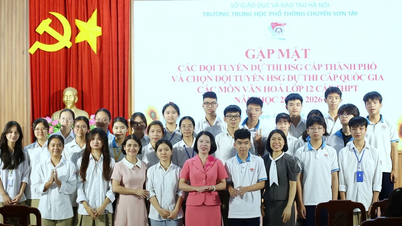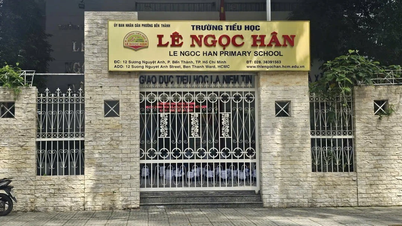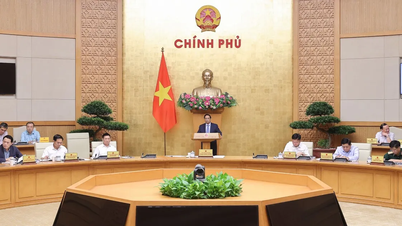Streamline the apparatus, increase efficiency
The regulation to abolish school boards in public educational institutions in Resolution No. 71-NQ/TW on breakthroughs in education and training development of the Politburo is a strategic step, affirming the comprehensive and direct leadership role of the Party organization, towards an effective, streamlined and substantial education system.
The 2019 Education Law stipulates that the School Council of a public school is the school's governance organization, exercising the right to represent the school's ownership and related interested parties.
In particular, the School Council for nurseries, kindergartens, preschools, and general education institutions decides on the direction of school activities, mobilizes and supervises the use of resources for the school, connects the school with the community and society, and ensures the implementation of educational goals.
The composition of the school council for nurseries, kindergartens, preschools, and general education institutions includes the Party Committee Secretary, Principal, Union Chairman, Ho Chi Minh Communist Youth Union Secretary, representative of the professional group, representative of the office group, representative of the local government, parent representative board, and student representative for junior high schools and high schools.
However, after more than 5 years of implementing the 2019 Education Law, the school board has mostly operated in a formal manner, with a vague role and overlapping with the functions of the principal or Party organization.
Ms. Nguyen Thi Dung, a teacher at Van Coc High School (Hanoi) said that in Article 55 of the 2019 Law on Education, the School Council at public preschool and general education institutions is the school's governing organization, exercising ownership representation rights, and participating in deciding the school's operating direction.
However, most public preschool and general education institutions have not been granted autonomy in finance, organization or personnel. Therefore, the functions and tasks of the School Council in these educational institutions are mainly carried out by school leaders or specialized departments, leading to duplication in form and ineffectiveness in substance.
Mr. Nghiem Hong Trung - Principal of Quoc Oai High School (Hanoi) said that in most schools, the principal is also the Chairman of the School Council and the Secretary of the Party cell/Party Committee, leading to overlapping roles and blurring the supervisory and critical functions of the School Council.
Maintaining the School Council in that context is not only ineffective but also increases the administrative burden. Therefore, abolishing the School Council regulation in public kindergartens and general schools in the spirit of Resolution No. 71-NQ/TW is a necessary step to streamline the apparatus and increase implementation effectiveness.

Removing bottlenecks in administration
At the university level, the council is designed to exercise autonomy, separating political leadership and administrative management, helping to reduce the concentration of power in the principal. However, in reality, at many public universities, the school council has become a bottleneck in governance.
Prof. Dr. Nguyen Quy Thanh - Rector of the University of Education (Hanoi National University) commented: Resolution No. 71-NQ/TW has ended the long debate on the role of the university council in public universities. This solution is a strong adjustment to increase the effectiveness of direction.
Resolution No. 71-NQ/TW has set out a specific policy: Not to organize school councils in public educational institutions (except for schools with international agreements), and at the same time to implement the model of Party Secretary cum Head of the school. At the university level, this model is considered to help shorten the decision-making cycle, create unity in leadership and operate more effectively.
According to experts, the school council in public universities is expected to be the highest authority institution, helping to implement autonomy and reduce the focus on the principal. However, practice shows that this mechanism has created loops in the decision-making process, slowing down operations and sometimes causing conflicts between departments within the school.
For Resolution No. 71-NQ/TW to be effectively implemented, the legal system must be updated accordingly. Three sets of laws, including the Law on Education, the Law on Higher Education and the Law on Vocational Education, need to be amended and supplemented synchronously. This is not only to eliminate legal conflicts, but also to establish a clear operating framework for the university autonomy mechanism in the new period.
Many education experts also agree that, in the context of the political system moving towards streamlining and effectiveness, redesigning the school governance model in the direction of shortening the focal points and strengthening the direct leadership role of the Party Committee is appropriate. Abolishing school councils in public institutions will help rebuild the decision-making system in a more coherent, quick and effective way.
From the educational practice at all levels, it can be seen that the policy of abolishing school councils in public educational institutions in the spirit of Resolution No. 71-NQ/TW is a suitable adjustment step, consistent with the direction of administrative reform, streamlining the apparatus and strengthening the direct leadership role of Party organizations, is a practical solution to improve governance effectiveness, helping educational institutions operate quickly, effectively and focus more on professional quality.
Source: https://giaoducthoidai.vn/buoc-dieu-chinh-phu-hop-cua-nghi-quyet-71-post747635.html







![[Photo] Hanoi morning of October 1: Prolonged flooding, people wade to work](https://vphoto.vietnam.vn/thumb/1200x675/vietnam/resource/IMAGE/2025/10/1/189be28938e3493fa26b2938efa2059e)













![[Infographic] The number of applications for university and college admission in 2025 has increased sharply](https://vphoto.vietnam.vn/thumb/402x226/vietnam/resource/IMAGE/2025/10/1/8da66b78e0b3468496721724246e3857)












![[Photo] Panorama of the cable-stayed bridge, the final bottleneck of the Ben Luc-Long Thanh expressway](https://vphoto.vietnam.vn/thumb/1200x675/vietnam/resource/IMAGE/2025/9/30/391fdf21025541d6b2f092e49a17243f)


























































Comment (0)